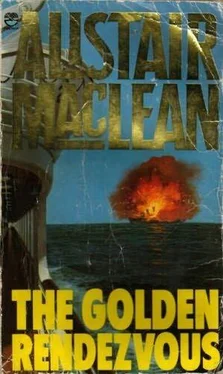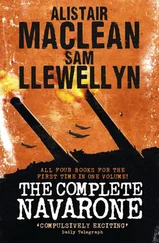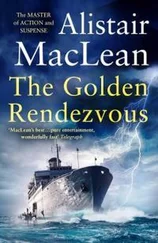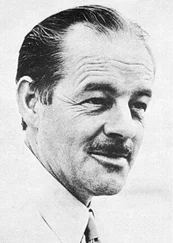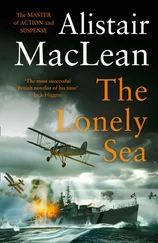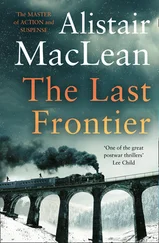But the first person who caught my eye was not Dr. Marston but Miguel Carreras. He was standing near the top of my bed; maybe he had been shaking me awake. He was newly shaven, looked fresh and rested, had his neatly bandaged right hand in a sling, and carried some charts under his arm. He gave me a slight smile.
“Good morning, Mr. Carter. How do you feel now?” I ignored him. Susan Beresford was sitting at the doctor’s desk. She looked pretty tired to me and there were dark smudges under the green eyes. I said, “Susan, where’s doc Marston?”
“Susan?” Carreras murmured. “How swiftly contiguity breeds familiarity.”
I ignored him again. Susan said, “in the dispensary, asleep. He’s been up most of the night.”
“Wake him, will you? Tell him I want this damned weight off. It’s tearing my leg in two.”
She went into the dispensary and Carreras said, “Your attention, Mr. Carter, if you please.”
“When I get that weight off,” I said surlily. “Not before.” Dr. Marston appeared, rubbing the sleep from his eyes, and started to remove the weight without a word.
“Captain Bullen and the bo’sun?” I asked. “How are they?”
“The captain’s holding his ownust.” The old boy looked tired and sounded tired. “The bo’sun’s recovering fast. Both of them came to early this morning; I gave them sedatives. The longer they sleep, the better.”
I nodded, waited till he had lifted me to a sitting position and adjusted my leg, then said curtly, “What do you want, Carreras?”
He unrolled a chart and spread it over my knees. “A little navigational assistance cross-checking, shall we call it? You will co-operate?”
“I’ll cooperate.”
“What?” Susan Beresford crossed from the desk and stared down at me. “You you’re going to help this man?”
“You heard me, didn’t you? What do you want me to be a hero?” I nodded at my leg. “Look where being heroic’s got me.”
“I wouldn’t have believed it!” Patches of colour flared in the pale cheeks. “You. Going to help this — this monster, this murderer.”
“If I don’t,” I said wearily, “He’ll like as not start on you. Maybe break a linger at a time or yank out a tooth at a time with Dr. Marston’s forceps — and without anaesthetic. I’m not saying he’d like doing it, but he’d do it.”
“I’m not afraid of Mr. Carreras,” she said defiantly. But she was paler than ever.
“Then it’s time you were,” I said curtly. “Well, Carreras?” “You have sailed the north Atlantic, Mr. Carter? Between Europe and America, I mean?”
“Many times.”
“Good.” He jabbed at the chart. “A vessel leaving the Clyde and sailing for Norfolk, Virginia. I wish you to sketch the course it would take. Any reference books you wish I can have fetched.”
“I don’t require any.” I took his pencil. “North’s about round Ireland, so, a slightly flattened great circle route along the westbound summer lane, so, to this point well southeast of Newfoundland. The northward curve looks strange, but that’s only because of the projection of the chart: it is the shortest route.”
“I believe you. And then?”
“Shortly after that the course diverges from the main westbound New York lane, approximately here, and comes into Norfolk more or less from the east-northeast.” I twisted my head round to try to see out of the surgery door. “What’s all that racket? Where’s it coming from? Sounds like riveting guns or pneumatic chisels to me.”
“Later, later,” he said irritably. He unrolled another chart and the irritation vanished from his face. “Splendid, Carter, splendid. Your track coincides almost exactly with the information I have here.”
“Why the hell did you ask me — "
“I double-check everything, Mr. Carter. This vessel, now, is due to arrive at Norfolk at exactly ten o’clock at night, on Saturday, in two days’ time. Not earlier, not later: exactly ten o’clock. If I wish to meet that vessel at dawn that day, where would the interception point be?”
I kept my questions to myself. “Dawn, in that latitude, at this time, is five o’clock, give or take a few minutes. What speed does this vessel do?”
“Of course. Foolish of me. Ten knots.”
“Ten knots. Seventeen hours. One hundred and seventy nautical miles. The interception point would be here.”
“Exactly.” He’d consulted his own chart again. “Exactly. Most gratifying.” He looked at a slip of paper in his hand. “Our present position is 26.52 north, 76.33 west, near enough, anyway. How long would it take us to get to this interception point?”
“What is that hammering outside?” I demanded. “What devilry are you up to now, Carreras?”
“Answer my question!” he said sharply. He held all the cards.
I said: “What’s our speed just now?”
“Fourteen knots.” “Forty-three hours,” I said after a minute. “Just under.”
“Forty-three hours,” He said slowly. “It’s now ten a.m. Thursday and I have to rendezvous at five a.m. On Saturday. My god, that is only forty-three hours.” The first shadow of worry crossed his face.
“What is the maximum speed of the Campari?”
“Eighteen knots.” I caught a glimpse of Susan’s face. She was fast losing all her illusions about chief officer Carter.
“Ah! eighteen?” His face cleared. “And at eighteen knots?”
“At eighteen knots you’ll probably tear the stabilisers off and break up the Campari,” I told him.
He didn’t like that. He said, “What do you mean?”
“I mean you’ve got trouble coming, Carreras. Big trouble.”
I looked at the window. “I can’t see that sea, but I can feel it. An abnormally long deep swell. Ask any fisherman in the Bahamas what that means at this time of the year and he’ll tell you. It can mean only one thing, Carreras tropical storm, pretty certainly a hurricane. The swell is coming from the east, and that’s where the heart of the storm lies. Maybe a couple of hundred miles away yet, but it’s there. And the swell’s getting worse. Have you noticed? it’s getting worse because the classic path of a hurricane in these parts is west northwest, at a speed of ten to fifteen miles an hour. And we’re heading north by east. In other words, tee hurricane and the Campari are on a collision course. You started listening to some weather reports, Carreras.”
“How long will it take at eighteen knots?” He pressed.
“Thirty-three hours. About. In good weather.”
“And the course?”
I laid it off and looked at him. “The same as you have on that chart, undoubtably.”
“It is. What wavelength for weather reports?”
“No wave length,” I said drily. “If there’s a hurricane moving in westwards from the Atlantic, every commercial station on the eastern seaboard will be broadcasting practically nothing else.”
He moved across to Marston’s phone, spoke to the bridge, gave instructions for maximum speed and for listening in to weather reports.
When he’d finished, I said, “Eighteen knots? Well, I warned you.”
“I must have as much time as possible in hand.” He looked down at Bullen who was still rambling on incoherently in his sleep. “What would our captain do in those circumstances?” “Turn and run in any direction except north. We have our passengers to think of. They don’t like getting seasick.”
“They’re going to be very seasick, I’m afraid. But all in a good cause.”
“Yes,” I said slowly. I knew now the source of the hammering on deck. “A good cause. For a patriot such as yourself, Carreras, what better cause could there be? The Generalissimo’s coffers are empty. Not a soul in sight and his regime is tottering. Only one thing can save the sick man of the Caribbean — a transfusion. A transfusion of gold. This ship that we’re going to intercept, Carreras — how many millions in gold bullion is she carrying?” Marston was back in the surgery now, and he and Susan looked at me, then at each other, and you could see their mutual diagnosis: delayed shock had made me light-headed. Carreras, I could see, wasn’t thinking anything of the kind: his face, like his body, had gone very still.
Читать дальше
Конец ознакомительного отрывка
Купить книгу
